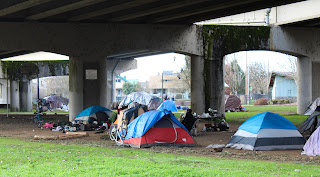Salem Peaceful Protest on President Joe Biden's Inauguration Day.
SALEM -- After the Capitol in Washington, D.C., was stormed by protesters, rumors circled the nation that more protests could happen at all state capitals on President Joe Biden's inauguration day. The rumors filled social media platforms, and both the City of Salem and local and state police informed the public of the potential for a violent protest.
However, on Wednesday, Jan. 20, it was a quiet and rather calm day at the Capitol in Salem.
Across the street from the Capitol a small crowd formed, not exceeding 25 people at any time.
One woman flew an American and a Biden flag, and one man held up a cardboard sign criticizing those on the left, another man held two signs against President Trump, and two men calling themselves the “gospel guys” shared their message of Jesus and Christianity. This was the entirety of the protest, where journalists with cameras expecting a story outnumbered protesters.
Many civilians walked by with camera phones, while the police circled the block, and cars honked their horns in support or disapproval.
The front of the Capitol was bare of people, however, in front of the gates that surrounded the building knelt a man with a folded up flag and a lit candle, praying. His face and eyes were covered, and he declined to state his name.
The man did not move from his position throughout the protest.
“I committed to God that I would be here no matter what. I got here just as the sun was going up, and I plan on being here until sunset,” he said.
“I’m just praying today that people who walk on this ground will feel peace.”
“To me it’s energetics. … You don’t need to speak to get the energy out there, you can feel it. … Just the energy of me out here is doing something, and I’m trusting that God has asked me to be here for a purpose.
“Whatever we do, it doesn’t matter if people see it or not, because it’s the energy that follows that matters.”
He spoke about how we are all one body here in the world, and in the United States, and that “we cannot cut off one body part,” and the division between the two political parties is causing that to happen.
“It’s not about the left or the right, it’s a cultural issue.”
“My ancestors came over on the Mayflower, and they’ve been here ever since. That blood is in me. One of my Irish ancestors married a Cherokee, and so I have Cherokee blood. There is Catholicism in my family, and some of the first Mormons are in my blood line, as well as the Oregon settlers, and Montana cowboys; it’s just all in there!”
“You can’t pick and choose, that’s my history. It’s the same with this country and its people, we don’t get to pick and choose, we have to learn to live with us all. We have to find a way to get along, cause we can’t divide off any one part,” he said.
This man said he hopes for accountability among the hearts of the people in this country.
“If we all as citizens take personal accountability for our own lives, never feeling like a victim, things will be better. If there's a challenge to hate, think: ‘How do I solve this and what do I do to make my life better? … It starts with personal accountability.”
As seen on social media, opinions over what happened at the nation’s Capitol included many who were scared, and that the Capitol invasion instilled fears over safety and personal rights, or an attack on America itself.
Michigan Congressman Dan Kildee tweeted during the D.C. protest: “I am in the House Chambers. We have been instructed to lie down on the floor and put on our gas masks. Chamber security and Capitol Police have their guns drawn as protesters bang on the front door of the chamber. This is not a protest. This is an attack on America.”
The praying man at the Salem Capitol said, “The thing that happened at the Capitol, all those people, they said, ‘President Trump told me to do this,’ and that’s not personal accountability. It’s destructive, and just perpetuates the same things. I just feel like I have to pray for peace.”
He talked about our freedom: “We come here and we get to choose. That’s why accountability is so important, no matter whether you're a homeless person or the POTUS”
“People need to feel peace in their hearts. There’s just so many people who have been terrorized by Donald Trump...By Trump saying, ‘If I am not the president, this country will cease to exist,’ well that's terrorizing people because it’s not true. He’s been so good at scaring people.”
“We have to remind people that they are part of our family, that we don’t hate or disapprove of them, we have to reach out to them. We all suffer from the human condition … we have a short amount of time that we’re alive, and so we have to learn the same lessons. … But that’s why we're here, to experience these lessons, and that’s why freedom is so important,” he said.
“There’s an energetic balance to the world, and our prayers, energy, and thoughts all matter.”
The man sat in silent protest for the remainder of the day, praying for peace among the masses. Nobody else talked to him for the remainder of the protest.
Was it the fear of getting arrested that kept the State Capitol at peace that day? Or was it a realization that what happened in D.C. was not good? Perhaps it was the thought and wishes of peace among many. Regardless, there was one lone man out there that day, who seemed to have all our best interests in mind.






